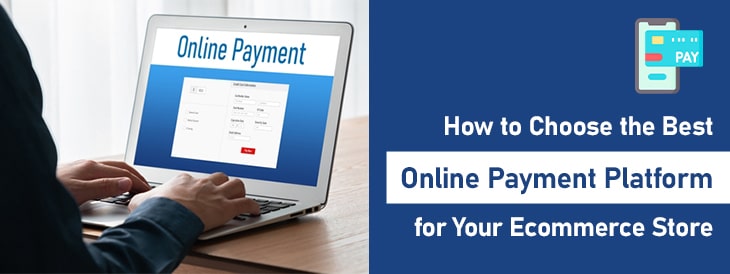How to Choose the Best Online Payment Platform for Your Ecommerce Store
How to Choose the Best Online Payment Platform for Your Ecommerce Store

Introduction to Online Payment Platforms
In today’s digital marketplace, the choice of an online payment platform can significantly impact the efficiency and success of your e-commerce store. With a myriad of options available, it’s essential to pick a platform that not only facilitates smooth and secure transactions but also aligns with your business model and customer expectations.
Online payment platforms serve as the bridge between your customers and your bank account, handling the intricate process of transferring funds securely. This is why choosing the right one is more than just a technical decision; it’s a strategic move that can affect your store’s reputation and customer satisfaction levels.
Several platforms like PayPal, Stripe, and Square offer a variety of features tailored to different business needs. Whether you are running a small boutique with limited products or a large online marketplace with diverse offerings, there is a platform designed to meet your specific requirements.
When examining your options, consider the ease of integration with your current e-commerce setup. Compatibility with your website builder, shopping cart, and other essential tools is vital for seamless operations. The less time you spend troubleshooting technical issues, the more time you can devote to growing your business.
Another crucial aspect to consider is the platform’s support for different types of transactions. Some platforms are better suited for one-time purchases, while others excel in managing subscriptions or international transactions. Evaluating these features in the context of your business model can guide you towards a more informed decision.
As you explore different payment platforms, keep an eye on their customer service and support options. Quick and effective customer service can be a lifesaver when you encounter issues, ensuring minimal disruption to your business operations.
Some Related Blogs
- Top Online Payment Platforms for Small Businesses in 2025
- High-Risk Payment Gateways vs. Traditional Payment Gateways: Key Differences
- The Future of High-Risk E-commerce Payment Gateways: Trends to Watch
- What Makes an E-commerce Business High-Risk and How to Find a Payment Gateway for It
Understanding Your Business Needs
Understanding your business’s unique needs is fundamental when selecting an online payment platform. Start by assessing the size and scope of your e-commerce store. For instance, a small shop with a limited product range might benefit from a straightforward, easy-to-integrate platform. In contrast, a larger store with an extensive inventory could require a more comprehensive solution with advanced capabilities..
Next, think about the type of products or services you offer. Platforms differ in their ability to handle various transaction types. Some are optimized for physical goods, while others excel at managing digital products or subscription services. Knowing which platform is best suited for your offerings can save you from future headaches.
Integration is another key consideration. Your payment platform should work seamlessly with your existing systems, whether it’s your website builder, shopping cart, or accounting software. A well-integrated platform ensures a smooth experience for both you and your customers, minimizing the risk of technical issues that could interrupt transactions.
Customer demographics and preferences also play a role. If you have an international customer base, look for platforms that support multiple currencies and localized payment methods. Conversely, if your customer base is primarily domestic, a simpler platform may suffice.
Additionally, consider your store’s growth potential. While a basic solution might work for now, a scalable platform can accommodate future expansion without requiring a complete overhaul. Look for features that can be activated as your business grows, such as advanced analytics or more robust fraud protection.
Lastly, think about the customer experience. A platform that offers a user-friendly checkout process can reduce cart abandonment rates and boost overall satisfaction. Prioritize platforms known for reliability and ease of use to ensure a positive shopping experience for your customers.
Evaluating Security Features
Security is a critical aspect of any e-commerce store. When evaluating online payment platforms, scrutinize the security measures each provider employs to protect sensitive information. Strong encryption protocols are essential for safeguarding customer data during transactions. Additionally, ensure that the platform complies with industry standards such as PCI DSS (Payment Card Industry Data Security Standard), which sets the benchmark for security in online payments.
Consider platforms that offer advanced security features like two-factor authentication and tokenization. Two-factor authentication provides an extra layer of security by requiring users to verify their identity through a second method, such as a text message code. Tokenization replaces sensitive card information with a unique identifier, making it useless if intercepted by malicious actors.
It’s also important to review the platform’s history with security breaches. Look for providers with a solid track record in maintaining the integrity of customer data. Platforms that frequently encounter security issues could put your business at risk.
Investigate whether the platform provides real-time fraud detection and prevention tools. These tools can help identify suspicious activities and prevent fraudulent transactions before they impact your business. Some platforms also offer customizable fraud filters that allow you to set specific parameters tailored to your risk tolerance.
Finally, examine the customer support options available for security-related issues. Quick and effective support can be invaluable when dealing with potential security threats. Platforms that offer dedicated support for security concerns can help you resolve issues swiftly and minimize disruptions to your business operations.
Assessing Transaction Fees and Costs
When choosing an online payment platform, it’s essential to understand the associated costs. Transaction fees can differ greatly among providers, impacting your profit margins. Some platforms charge a flat fee per transaction, while others take a percentage of each sale. Evaluate which fee structure aligns with your business model and sales volume.
Beyond transaction fees, watch out for hidden costs like monthly fees, setup charges, or currency conversion fees. Additional features such as recurring billing or advanced analytics may also come with extra costs. It’s crucial to account for these in your overall expense calculations.
Also, consider how these fees will influence your pricing strategy. Higher transaction costs might force you to raise product prices, potentially affecting your market competitiveness. Strive to find a platform that balances cost and features, supporting your business goals without overburdening your budget.
![]()
Email us anytime!
Email customer service 24/7 at info@binarygateways.com
![]()
Call us anytime!
Reach customer care 24/7 at (801) 761-5001
